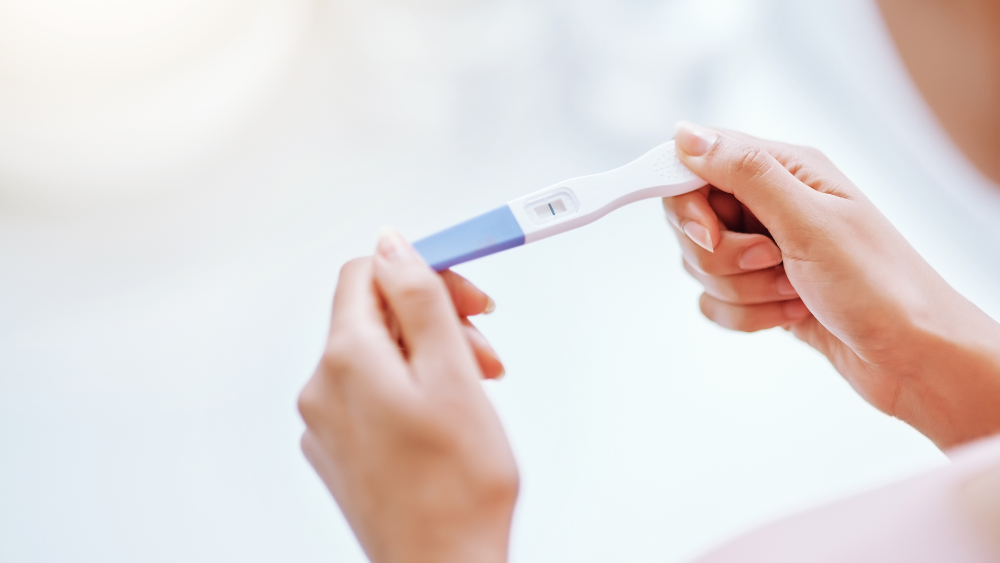
Have you and your partner been trying to conceive for a while, but are unable to? That is of course very annoying, especially if you do not know what the cause is. We are of course not gynaecologists, but we have worked out a number of possible reasons for you. Are you reading along?
Read also :'4 things you should know before taking a pregnancy test'
Getting pregnant is closely related to regular menstruation, approximately every 21 to 35 days. During ovulation, your ovary releases an egg that can be fertilized. But that moment is short-lived and you have to ovulate to get pregnant. The egg survives for about 24 hours, then you have to wait until your next cycle. Unfortunately, there can be several reasons why your cycle is irregular. Fortunately, there is a lot you can do to get your cycle regular again and you can use ovulation tests to see exactly when you could get pregnant.
You probably already knew this, but the younger you are, the easier it is to get pregnant. There is no universal age at which women develop fertility problems, but your egg supply and the quality of your eggs decline rapidly after age 35. Now of course you can't change your age when you are ready to have children, but you can watch how you get pregnant. …
Being overweight or underweight can affect your fertility as it affects your ovulation. PCOS is often associated with obesity because it affects the regulation of insulin in your body. It also contributes to irregular ovulation. Being underweight can also cause an irregular cycle. Do you want to get pregnant and are you underweight or overweight? Then try to work towards a healthy weight, which can significantly improve your fertility.
Of course your partner can also struggle with fertility problems. From hormonal and genetic reasons to environmental factors, your partner may be less fertile for a variety of reasons. Examples include a problem with the pituitary gland that releases hormones into the testicles, a blockage or exposure to toxins and chemicals such as alcohol and drugs. How do you find out? Have a thorough examination that tests the sperm for a variety of factors, from quantity and shape to motility. A balanced diet and regular exercise, smoking cessation and taking daily multivitamins also help.
Endometriosis – a condition in which the endometrial tissue grows outside the uterus, for example in the ovaries – is not only extremely painful, but can also reduce the chance of pregnancy. The condition can cause inflammation and pain where the tissue breaks down every month, but cannot be excreted. This can create scar tissue, which in turn can affect your fertility, for example by blocking your fallopian tubes. It's not impossible to get pregnant naturally if you have endometriosis, but it wouldn't hurt to look into alternative methods and discuss them with your doctor.
A blocked fallopian tube can be the result of endometriosis or other scar tissue. This prevents the egg from entering the uterus to be fertilized there. Surgery can help clear this blockage. You can also have an exam to see how blocked your ovaries are, called a hysterosalpingography. A dye is injected to check whether your ovaries are blocked or not. This procedure can also sometimes ensure that the block is lifted.
You may not have gotten pregnant yet because you have PCOS. Polycystic ovarian syndrome (PCOS) affects one in ten women and affects your ovulation. When you have PCOS, the hormones you need to mature an egg are not present, so ovulation does not occur and cysts can form on your ovaries. Other symptoms include abnormal hair growth, acne, obesity, depression and high blood pressure. Having PCOS doesn't necessarily mean you won't be able to have children, but it probably affects your ovulation. Therefore, discuss the options with your doctor to treat the condition.
There may also be other health issues that reduce your chances of conceiving. For example, think of autoimmune diseases such as lupus that affect your ovulation, or a previous STD that blocked your fallopian tubes. Certain medications, such as antidepressants, can also affect your fertility because they affect your hormones.
Another possible (and painful) cause of fertility problems is having fibroids. Fibroids are benign tumors that grow in your uterus. They can prevent a fertilized egg from implanting. Do you suspect you have a fibroid? Your doctor can perform tests and ultrasounds to find out if they affect your fertility. They can also be surgically removed if necessary.
If you decide to try to get pregnant and you stop taking the pill, it can take a while for you to get pregnant. That doesn't always have to be the case. For some it takes a few months before they start ovulating again, for others it happens immediately. Doesn't it work right? Then give your body time to repair itself. It takes almost a year and it still doesn't work? Then go to the gynaecologist to be sure.
Stress can also significantly reduce your chance of pregnancy. The stress hormone, cortisol, can affect your other hormones, making you less likely to ovulate or have your periods. Chronic stress is best tackled with mindfulness exercises and relaxing activities such as yoga, acupuncture and massages. Of course, it also doesn't help if you get stressed from the process of getting pregnant…
Have you been trying to conceive for a few months now with no success? Do not immediately assume that you are infertile. The term 'infertile' only comes up if you are not pregnant yet after a year of regular unprotected sex (having sex about every other day when you are ovulating). It may also be related to your age; women under 35 should wait up to a year before seeking medical attention, but women over 35 should do so after about six months.
Source:Womenshealthmag.com/uk